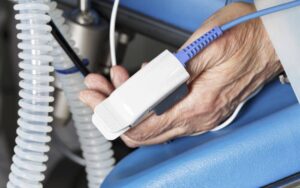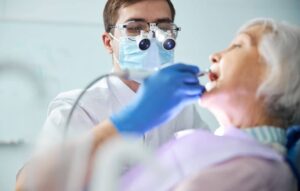How Can an Uncooperative Patient Receive Safe Dental Treatment?
Dentistry can be a daunting, fear-filled experience for many people. Medical complications such as dementia or previous traumatic experiences at the dentist can make dental treatment even more anxiety-inducing. This anxiety and fear can lead to patients becoming uncooperative during dental treatments.
Fortunately, through ground-breaking technology, increased understanding of the unique dental considerations of the elderly population, and our years of specialised experience, we have developed a variety of measures that allow us to provide safe, effective dental treatment to uncooperative patients.
For patients who are too stressed or cognitively impaired to cooperate during dental treatment, sedation dentistry provides a convenient, safe option. Our dedicated mobile dentistry team can visit aged care homes and nursing homes to provide sedation dentistry in a setting that is comfortable and familiar to the patient.
Here, we’ll look a how sedation dentistry is an invaluable tool for safely and effectively treating uncooperative patients and ensuring they still receive high-quality dental care.
IV or ‘Twilight’ Sedation
IV or ‘Twilight’ Sedation is a common, effective, and safe form of sedation. During this form of sedation dentistry, a highly qualified Anesthetist attends on-site and carries all the equipment necessary for sedation. They are also prepared with any equipment necessary for dealing with any possible complications if they arise.
Using their extensive experience and specialised training, they can gauge patient reactions and use their gentle manner to administer sedation.
This procedure has even been completed on 100-year-olds safely and without complications. Each individual receives a thorough medical evaluation before the procedure to ensure the patient’s safety.
The procedure works quickly and efficiently and can be stopped quickly if needed. Typically, patients can carry on with their normal day about half an hour after the procedure.
Oral Sedation
Oral sedation is another treatment option for uncooperative patients. This procedure involves the administration of a prescription tablet 90 minutes before the procedure. The patient must also fast before taking the tablet.
A medical history check is performed to ensure the person does not walk around and risk falling. The effect of the oral sedative can vary from person to person. Some people may feel very drowsy, while others may not feel the effect. This makes oral sedation less reliable than IV sedation and therefore less common.
What Are the Benefits of Sedation Dentistry?
Sedation dentistry can be used during a variety of dental procedures and is remarkable for decreasing anxiety and discomfort during the procedure.
If your loved one has been putting off dental work due to a phobia of dental visits or limited cooperation, we encourage you to reach out to our caring mobile dentistry team to talk about any questions or concerns you have.
Which Dental Procedures Can Be Performed Under Sedation?
X-rays, dental exams, fillings, extractions, denture appointments, and cleanings can all be completed under sedation.
Hospital Referral
Sometimes, people elect to be treated in a hospital under anesthetic for a procedure. We can write a referral for treatment in a hospital.
Providing Quality Care for Elderly Patients
Our primary focus is providing quality dental care to individuals who have behavioural, medical, or cognitive issues that prevent them from receiving dental treatment.
Dr. Bala can carry out procedures using a local anesthetic, oral sedation, and IV or ‘twilight’ sedation to provide safe, comfortable, effective dental treatments.
Whether your loved one is uncooperative due to a medical condition, experiences dental anxiety, or is unable to attend dental treatments at a traditional dental office, our team is fully equipped with everything needed to provide effective, caring treatment to your elderly loved one in the comfort of their home or aged care facility.

